Facebook Reels vs. Instagram Reels: Specifics and Performance Differences
Compare Facebook Reels and Instagram Reels. Explore features, growth potential, and benefits to find out which would work better for you.


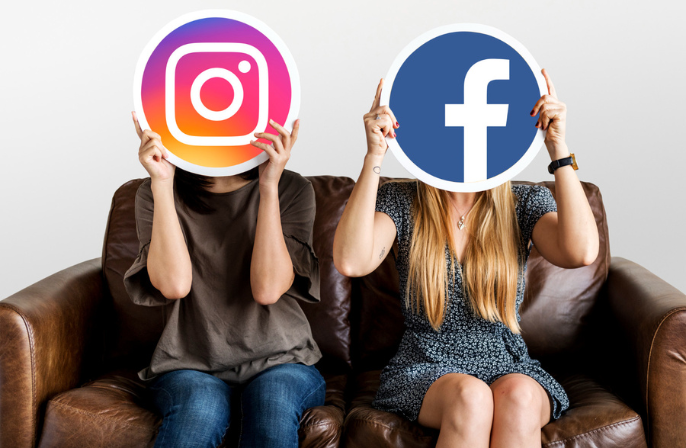
If your brand is betting on video marketing, you must wonder what results can you get by leveraging Facebook and Instagram Reels.
While both platforms promise reach and social media engagement, you must know there are some specifics to each that you should keep in mind when integrating them into your strategy.
Moving forward, I’ll guide you through the features, benefits, and drawbacks of Facebook Reels vs Instagram Reels, helping you pick the right channel for your goals.
Key takeaways
-
Facebook Reels: Best for broad reach and brand awareness with a diverse, slightly more mature audience.
-
Instagram Reels: Perfect for engaging younger audiences with trend-driven, creative content.
-
Content Strategy: Choose your platform based on your goals: use Facebook for awareness-building and Instagram for deeper audience connections.
What are the specifics of Facebook Reels?
Facebook has restructured its video strategy so that all uploaded videos are now treated as Reels.
For businesses, this isn’t just a format shift. It’s a distribution advantage.
Reels are now automatically pushed into discovery feeds, meaning even brands with modest Page followings can tap into fresh audiences.
From a technical standpoint, before the mentioned update, Facebook Reels could have a maximum of 90 seconds in a vertical, mobile-first format (full details here).
Facebook Reels can function as a low-barrier awareness tool, particularly effective for reaching broader, sometimes older demographics who are more active on Facebook than Instagram.
For businesses aiming at multi-generational audiences, it’s a natural entry point into short-form video without needing a highly “trendy” angle.
What are the specifics of Instagram Reels?
For a long time, Reels on Instagram have been the platform’s primary driver of visibility, and brands can’t afford to ignore them.
While Instagram Reels length now supports videos up to 3 minutes (180 seconds), the real differentiator isn’t the format, but the Instagram Reels algorithm.
Unlike Facebook, where distribution leans on broad reach, Instagram’s algorithm zeroes in on relevance and cultural fit. It actively pushes content that feels entertaining, authentic, and timely, even from accounts with smaller followings.
For businesses, this levels the playing field: a creative Reel can outperform a high-budget campaign if it strikes the right chord.
What does this mean strategically?
- Trend participation isn’t optional: brands that align with Instagram trends, popular audios, challenges, or editing styles get algorithmic boosts.
- Engagement signals drive visibility: saves, replays, and shares matter more than vanity likes.
- Content must feel “native”: over-produced ads tend to flop; relatable storytelling thrives.
For brands targeting Gen Z and Millennials, Instagram Reels offer a powerful way to embed themselves into daily culture rather than simply advertising to it.
What are the main differences between Facebook Reels and Instagram Reels?
Even though Facebook and Instagram have embraced short-form video content through Reels, each has unique features, algorithms, and user behaviors that can impact your social media content strategy.
Thus, understanding these differences is key to enhancing your social media optimization efforts.
Algorithm differences
Facebook Reels
Facebook Reels' algorithm emphasizes broad reach, often promoting your content to audiences who don’t follow you.
It’s designed to maximize content discoverability, so your Reels are likely to appear in feeds of people outside your immediate network, increasing the chances of viral growth.
Instagram Reels
Instagram’s algorithm is more engagement-driven, prioritizing content that generates likes, saves, and shares within users' social circles.
As a result, Instagram Reels tend to foster stronger connections with niche communities, allowing for better engagement but sometimes slower reach.
Core platform demographics and user behavior
Facebook Reels
Facebook’s demographic is more mature, with a stronger presence in the 25–44 age group.
Users tend to engage with family-oriented, lifestyle, and general entertainment content. If your goal is awareness campaigns, Facebook Reels can help you reach a diverse and broader audience.
Instagram Reels
Instagram skews younger, with Gen Z and Millennials dominating usage.
Users expect more trendy content. Instagram Reels are often more aspirational, making them ideal for fashion, beauty, and culture-driven marketing.
Editing tools and creative features
Facebook Reels
Facebook offers a streamlined editor with the basics: trimming, speed adjustment, and a few creative effects. It’s designed for easy, quick uploads rather than heavy customization.
Instagram Reels
Instagram provides more advanced editing tools, including transitions, templates, and timed text placements. These features give creators greater flexibility to produce polished content directly in-app, making Instagram stronger for storytelling.
Music and audio libraries
Facebook Reels
Facebook’s music library is large but slightly more limited than Instagram’s due to licensing differences.
However, you can also use original audio or trending sounds shared across the platform, which helps boost discoverability.
Instagram Reels
Instagram has one of the largest music and audio libraries available on any social platform. Trending audio often originates here before spreading to Facebook.
For brands, this allows more flexibility in following cultural trends.
Effects, filters, and AR capabilities
Facebook Reels
Facebook supports AR effects and filters but the catalog is smaller. Most options are ported from Instagram.
Instagram Reels
Instagram is known for its advanced AR and filter ecosystem, with creators frequently developing viral effects. Using these tools often increases engagement and makes content feel fresh.
Text overlay and sticker options
Facebook Reels
You’ll find basic text overlays and stickers on Facebook, but fewer customization options. They work well for straightforward captions or calls-to-action.
Instagram Reels
Instagram offers a wide range of stickers, polls, and interactive overlays, giving businesses and creators more ways to encourage engagement and boost social media metrics.
Analytics
Facebook Reels
Facebook Insights provides metrics like reach, plays, average watch time, and audience demographics. The platform emphasizes broader reach and discoverability data, making it valuable for campaigns focused on awareness.
Instagram Reels
Instagram offers deeper insights into interactions: saves, shares, comments, and retention rates. Instagram analytics are especially useful for brands optimizing content strategies for conversions and community engagement.
Comparison summary
When to focus on Instagram Reels vs. Facebook Reels?
Both Instagram Reels and Facebook Reels offer distinct advantages, so knowing when to focus on each can maximize your social media marketing efforts.
For content discovery
Facebook vs. Instagram Reels both have the potential to expose your content to a broader audience, but Instagram’s younger, trend-focused demographic often leads to quicker and more widespread engagement.
For what makes a good Reel, Instagram thrives on visually compelling content that grabs attention quickly—perfect for tapping into new communities and staying relevant with trending topics.
In contrast, Facebook Reels is a powerful tool for reaching a wider audience.
The platform’s algorithm pushes Reels beyond your followers, giving your content a greater chance of being seen by people who aren’t familiar with your brand.
This makes it an excellent choice for social media content that’s aimed at increasing general awareness, rather than relying solely on follower-driven engagement.
Facilitation of brand collaborations
When it comes to influencer marketing campaigns, Instagram Reels is the more robust platform.
The influencer community on Instagram is vast, and the features like direct product tagging, branded content tools, and shop now options make it an ideal environment for influencer marketing.
Whether it’s promoting a product in a fun, creative way or using trends to boost engagement, Instagram makes it easier for influencers to partner with brands and drive better social media KPIs.
Facebook Reels, while still useful for brand partnerships, often leans towards less direct collaboration.
The user base on Facebook generally consumes content in a more passive way, which can impact the level of interaction with influencer-driven campaigns.
However, if you’re looking to collaborate with influencers who focus on lifestyle or family content, Facebook Reels could offer a slightly different angle of engagement, especially in more casual niches.
Shopping integration and e-commerce features
For e-commerce brands, Instagram Reels stands out with its built-in shopping integration.
With the ability to tag products directly in Reels, users can seamlessly transition from discovery to purchase. This creates a smooth path for driving sales while showcasing products in a creative, engaging format.
For social media content that directly ties to product promotion, Instagram Reels is by far the best option for creating a video marketing strategy that converts.
While Facebook Reels does offer Facebook Shops for shopping-related content, it doesn’t have the same streamlined integration seen on Instagram.
That said, if you’re looking to drive traffic through posting Reels to Facebook, it can still be highly effective, especially when paired with Facebook Ads.
Too long didn’t read?
Here’s your summary:
How do Facebook Reels perform vs. Instagram Reels?
By using data from Socialinsider’s latest studies, we’ll dive into the key video metrics and share social media tips to compare how Instagram Reels stack up against Facebook Reels.
Engagement analysis
Facebook Reels
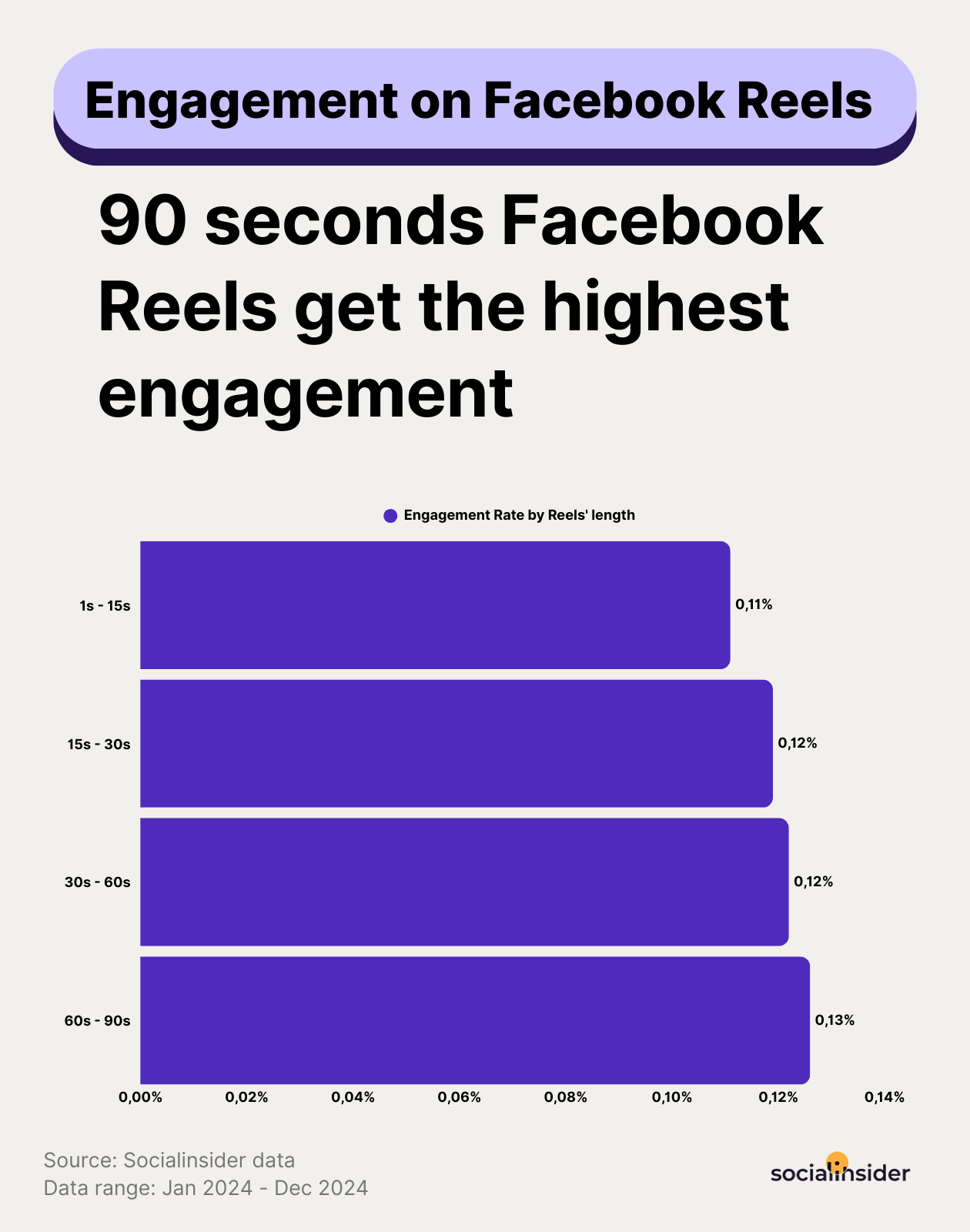
With an average engagement rate of 0.13% when it comes to getting more interactions on Facebook, Reels perform their best at the 90-second mark.
Instagram Reels
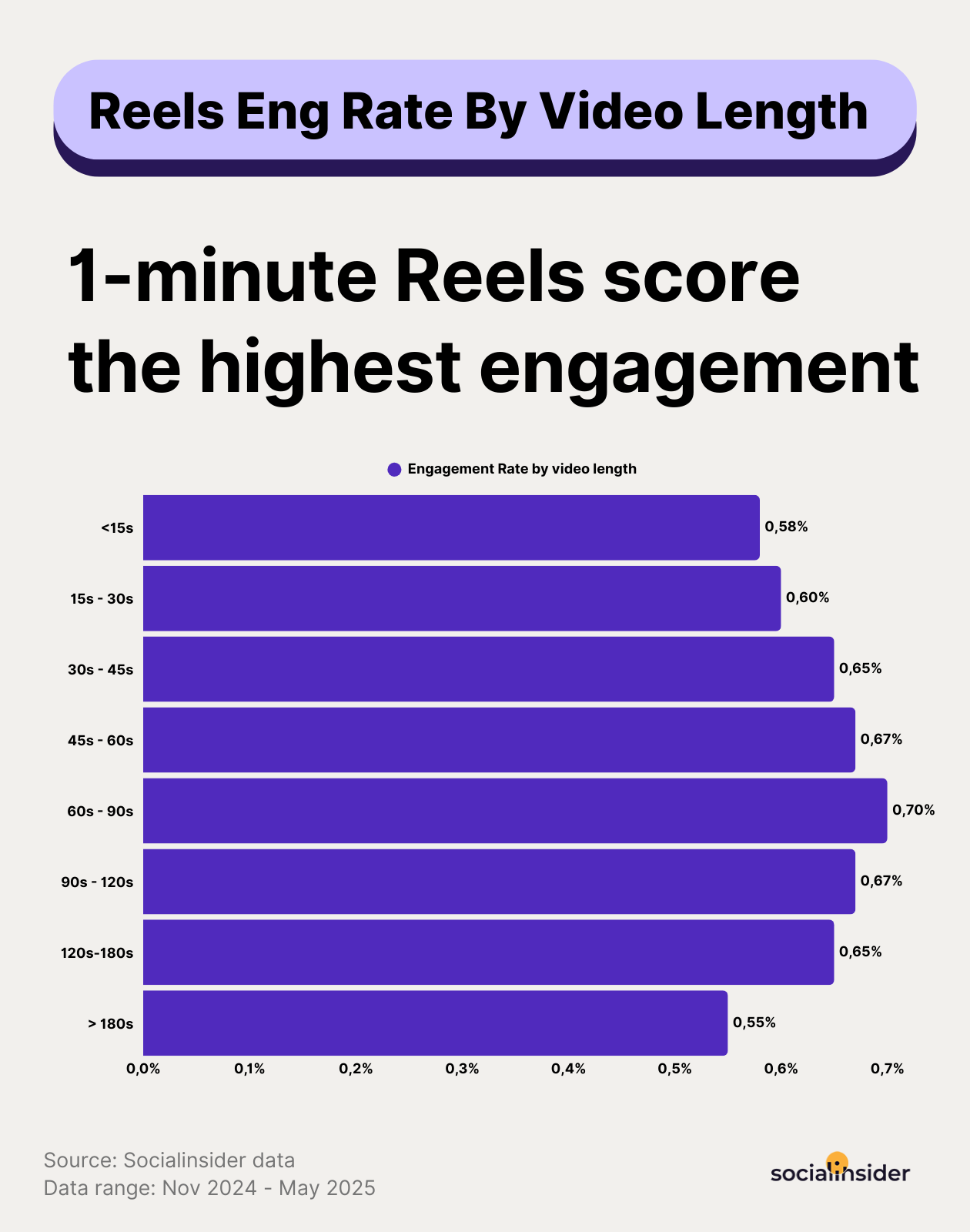
1-minute Reels lead the charge, boasting the highest Instagram engagement rate of 0.70%. These videos stand out in terms of user interaction, surpassing both shorter and longer Reels.
Shares analysis
Facebook Reels
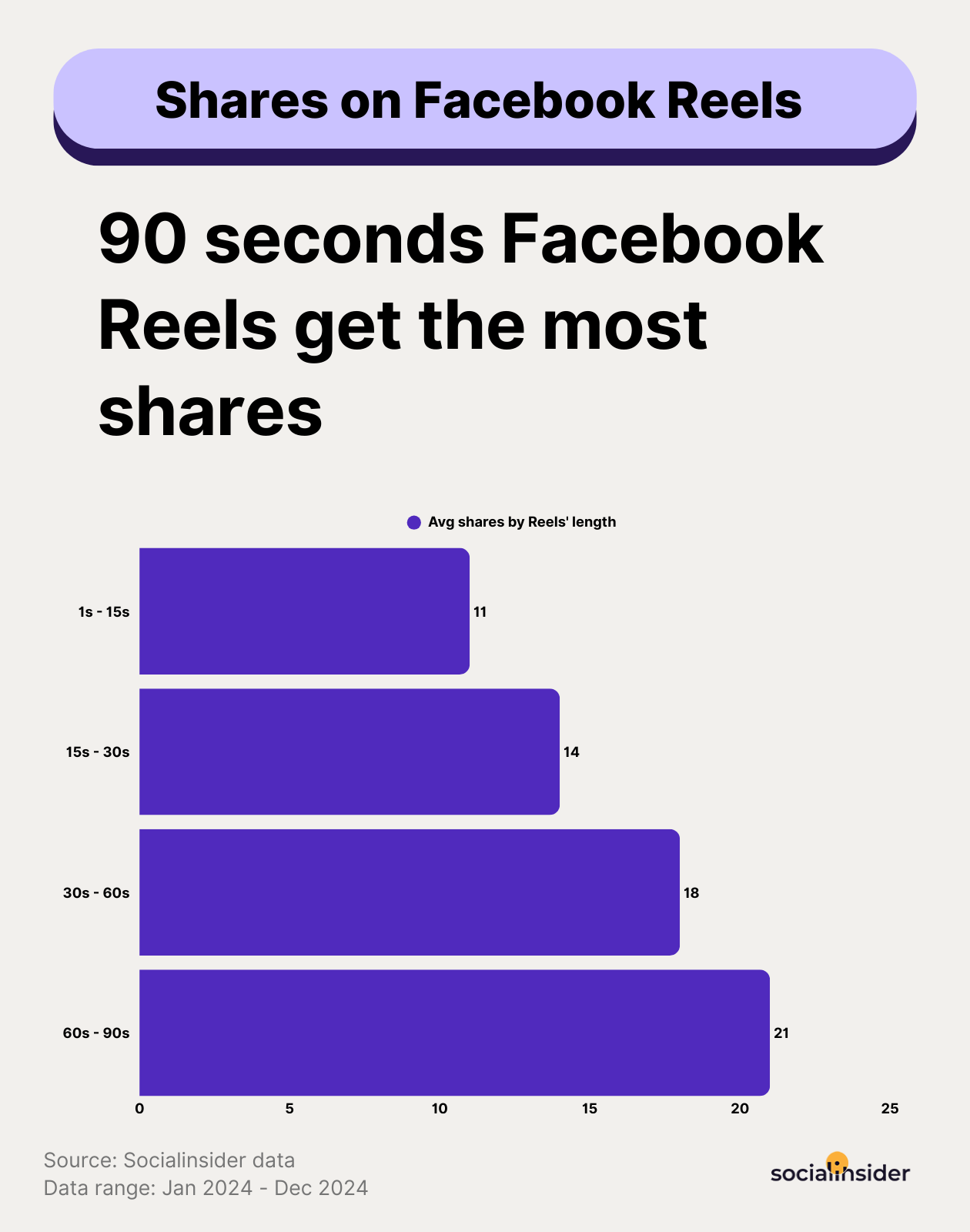
90-second Facebook Reels see the highest number of shares, with an average 21 shares per post. This suggests that viewers are more likely to share Reels of this length, making it a top-performing format for virality.
Instagram Reels
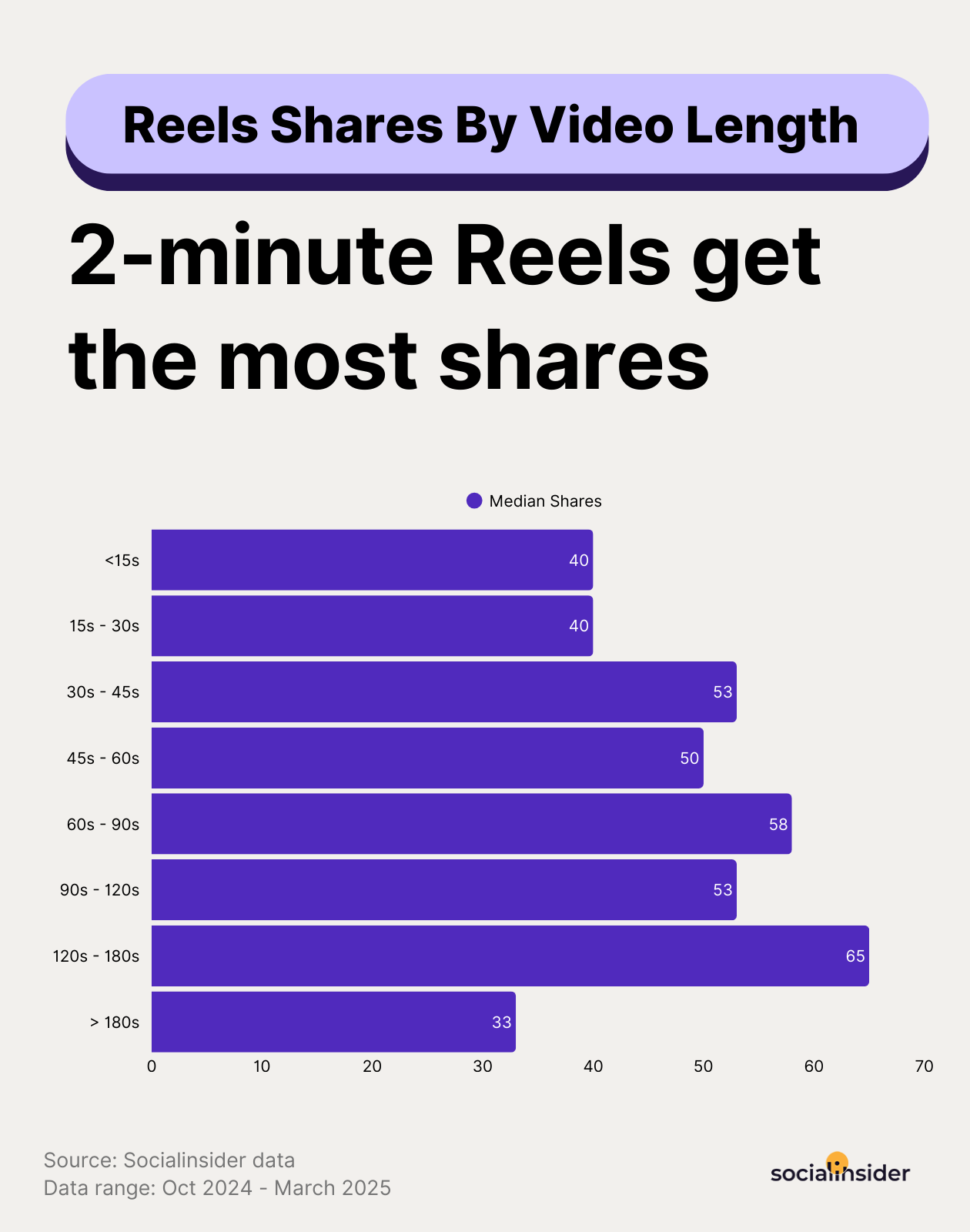
Based on collected data, Instagram’s most shared content comes from 2-minute Reels, with an average of 65 shares. These longer Reels seem to have more appeal, prompting users to share them more frequently than shorter videos.
Comments analysis
Facebook Reels
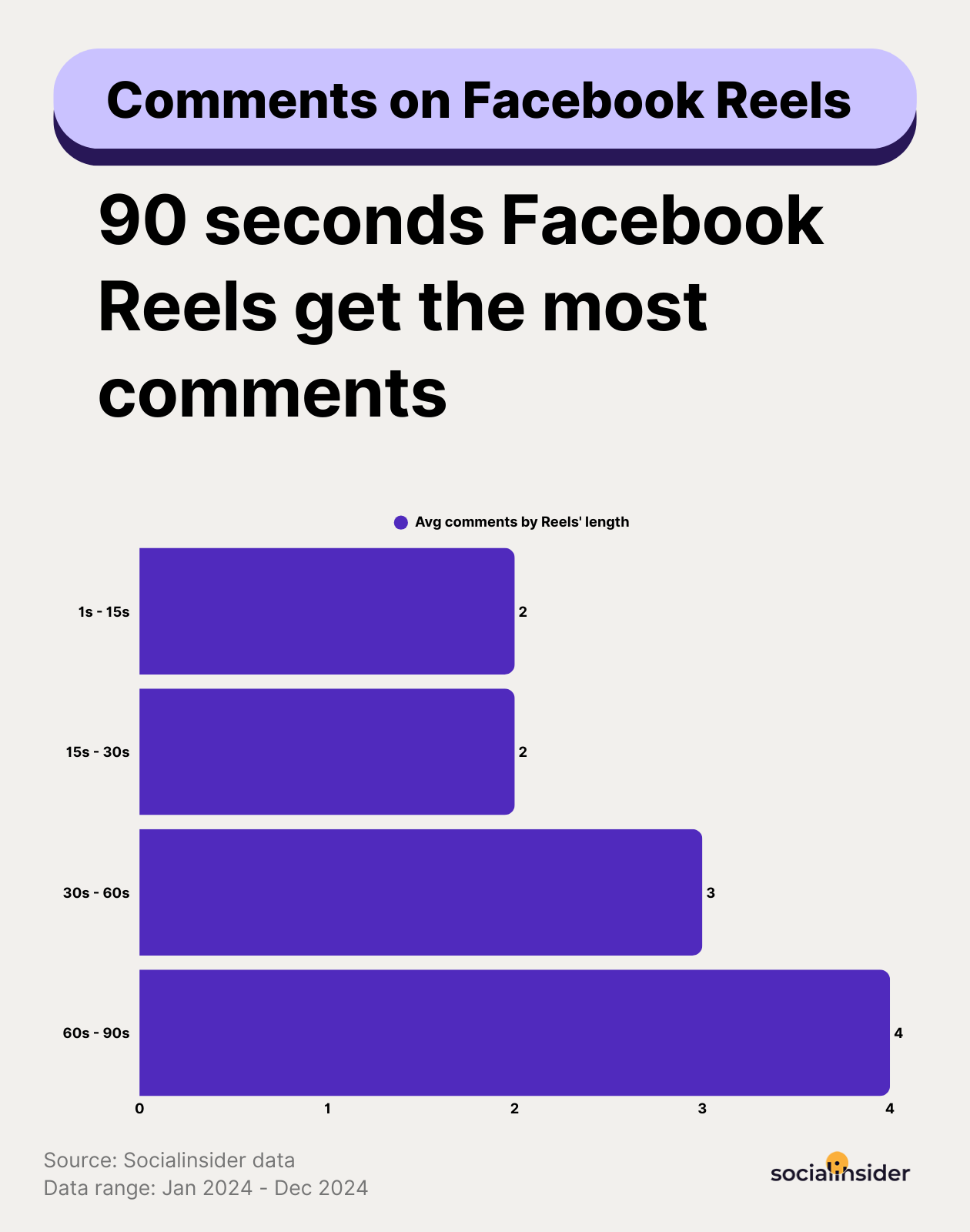
90-second Facebook Reels also perform better when it comes to generating comments. This shows that viewers are more inclined to engage in conversation when the video is this length.
Instagram Reels
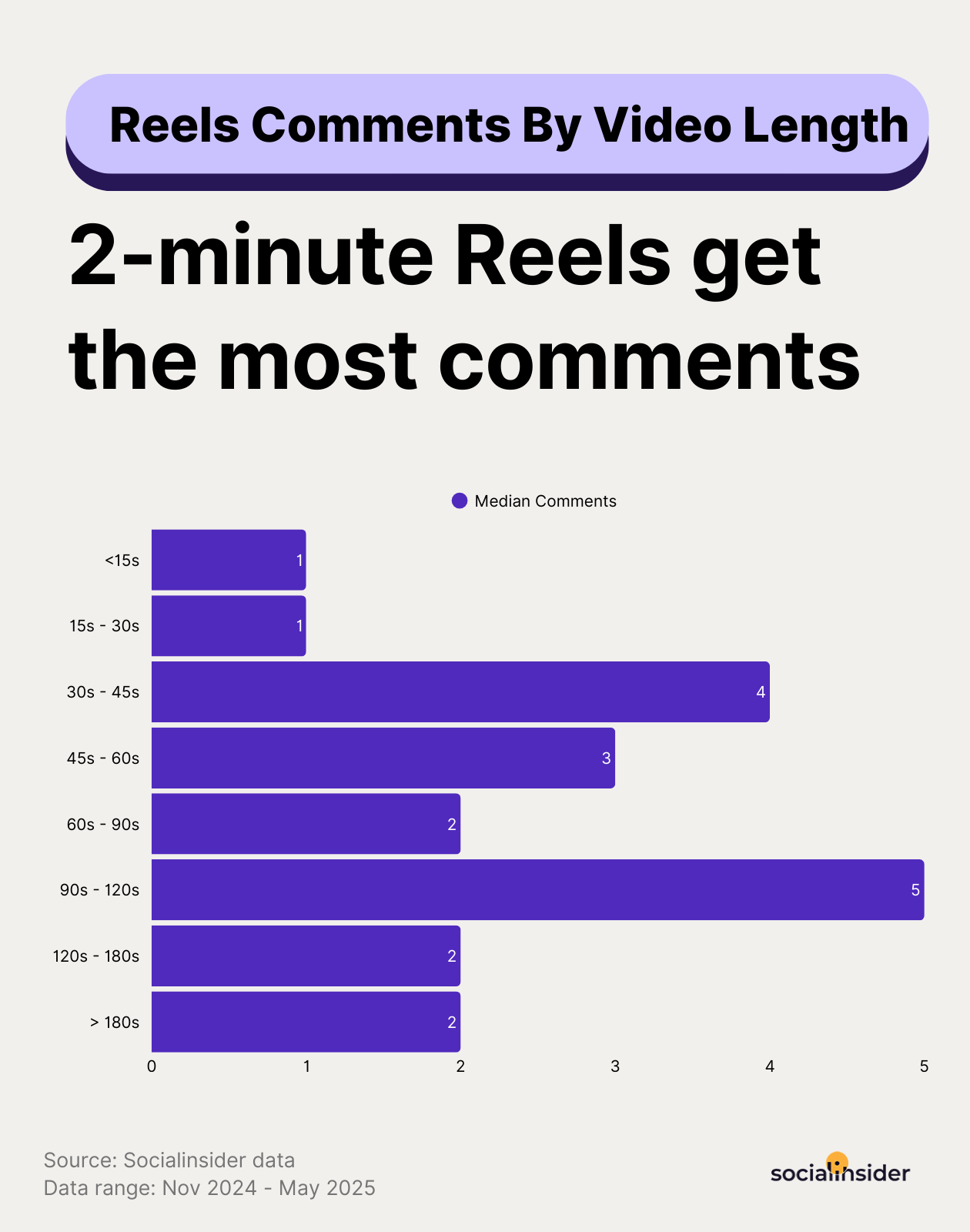
Similarly, 2-minute Instagram Reels generate the most comments. This suggests that Instagram users are more likely to leave feedback on longer content.
Views analysis
Facebook Reels
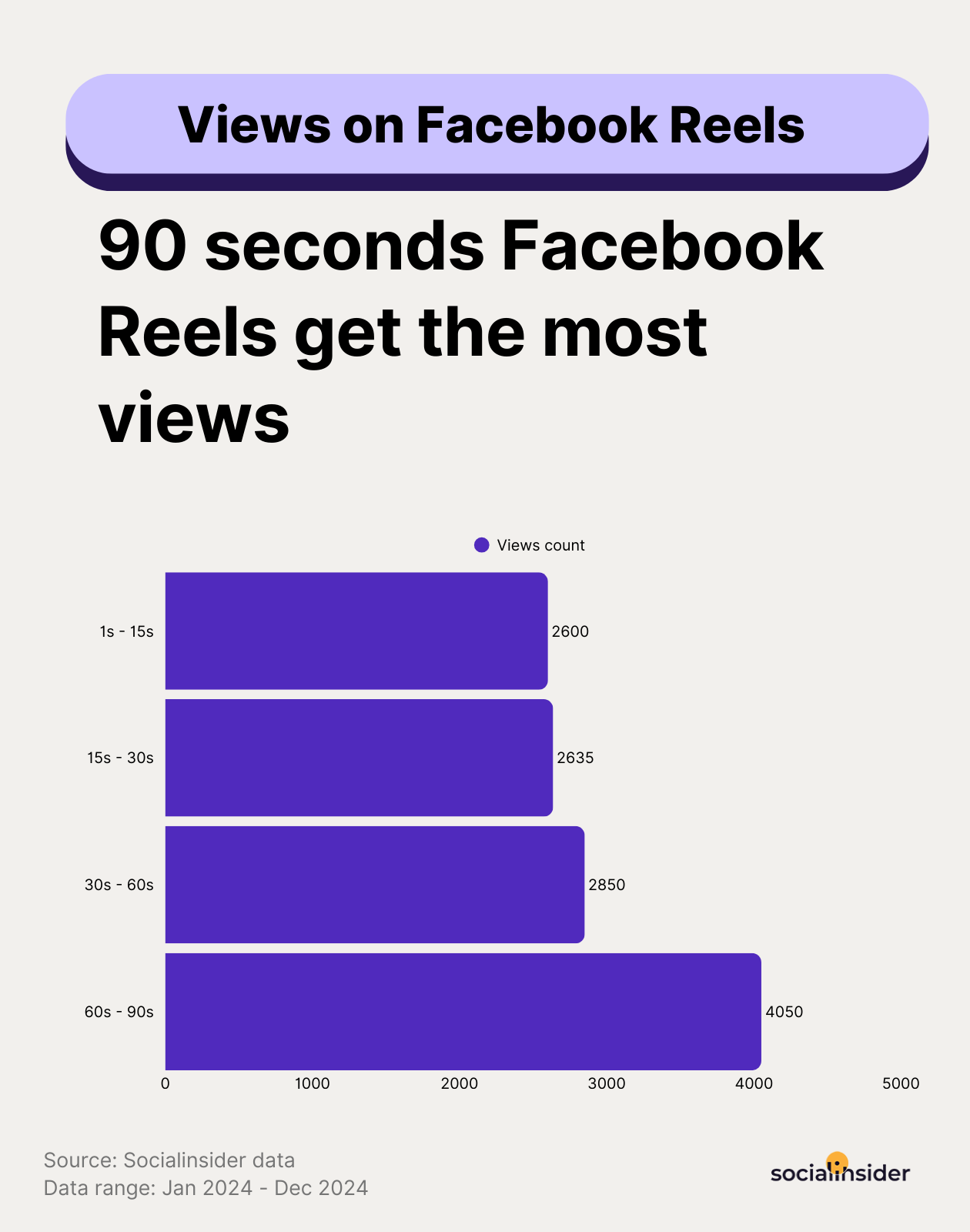
When it comes to views, the best Facebook Reels are 90 seconds long, averaging around 4K views per post. This video length hits the sweet spot, capturing the most viewers on the platform.
Instagram Reels
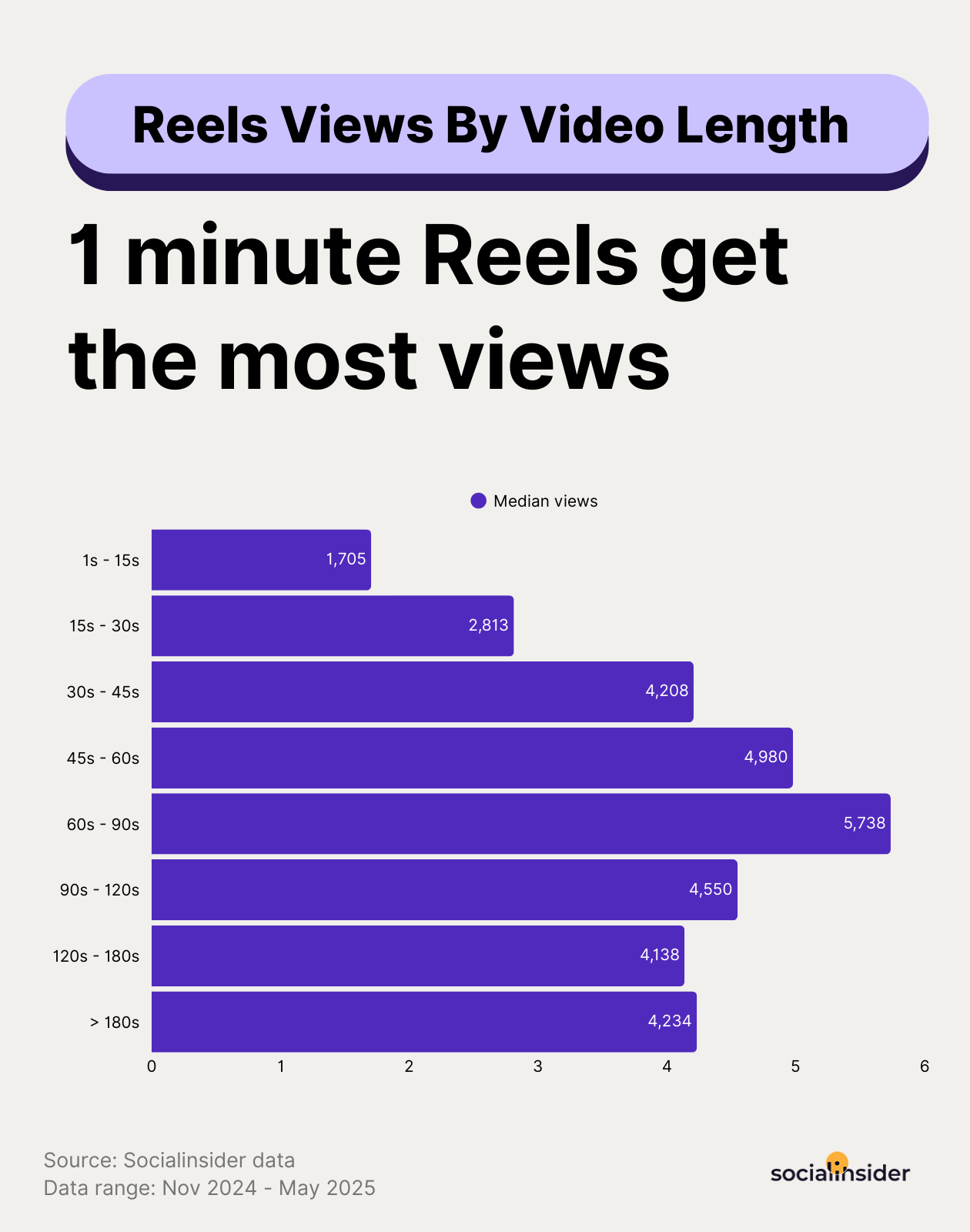
On Instagram, 1-minute Reels take the crown for most views, with a stunning average of 5.7K views per video. Short, impactful content clearly is more tailored to Instagram's audience, driving the highest number of views.
Content types that perform best for each platform
If you're a social media manager hunting for the perfect Reels ideas, you're in the right place.
From eye-catching trends to value-packed how-tos, the right content will not only boost engagement but take your video marketing strategy to the next level.
Instagram versus Facebook—here's what type of content performs better for each:
Top-performing content types for Facebook Reels
When it comes to Facebook Reels, content that resonates with users often strikes the perfect balance between education and engagement. Here are the top-performing content types:
- Educational & How-To Content: Offering value through educational content is a surefire way to boost engagement. Share step-by-step guides, tutorials, or insider tips that provide real utility to your audience.
- Behind-the-Scenes Business Content: Show your audience what goes on behind the scenes at your business. People love to feel included and connected, making BTS content a powerful tool to build community and trust.
- News & Current Events Commentary: Stay relevant by incorporating timely commentary on trending news and events. Facebook users appreciate content that keeps them informed, and by adding your insights, you can establish your brand as an authority.
- Motivational & Inspirational Content: Everyone needs a little boost now and then. Share motivational quotes, stories of perseverance, or positive messages that inspire your followers.
Top-performing content types for Instagram Reels
Instagram Reels are all about visual appeal and capturing quick attention.
Here’s what works best on this platform:
- Aesthetic & Lifestyle Content: Instagram thrives on beauty, creativity, and lifestyle content. Share stunning visuals that align with your brand’s aesthetic to captivate your audience in seconds.
- Entertainment & Humor: Light-hearted, funny content is a favorite among Instagram users. Incorporate humor, relatable moments, or even memes to keep your audience entertained and engaged.
- Quick Tips & Micro-Learning: Short, snappy tips are perfect for Instagram Reels. Whether it’s quick styling tips, productivity hacks, or DIY ideas, make sure your content is easily digestible.
- Trend-Based Content: Jumping on popular trends or challenges helps you stay relevant and relatable. By aligning with viral trends, you can increase your chances of appearing on users' feeds and engaging a larger audience.
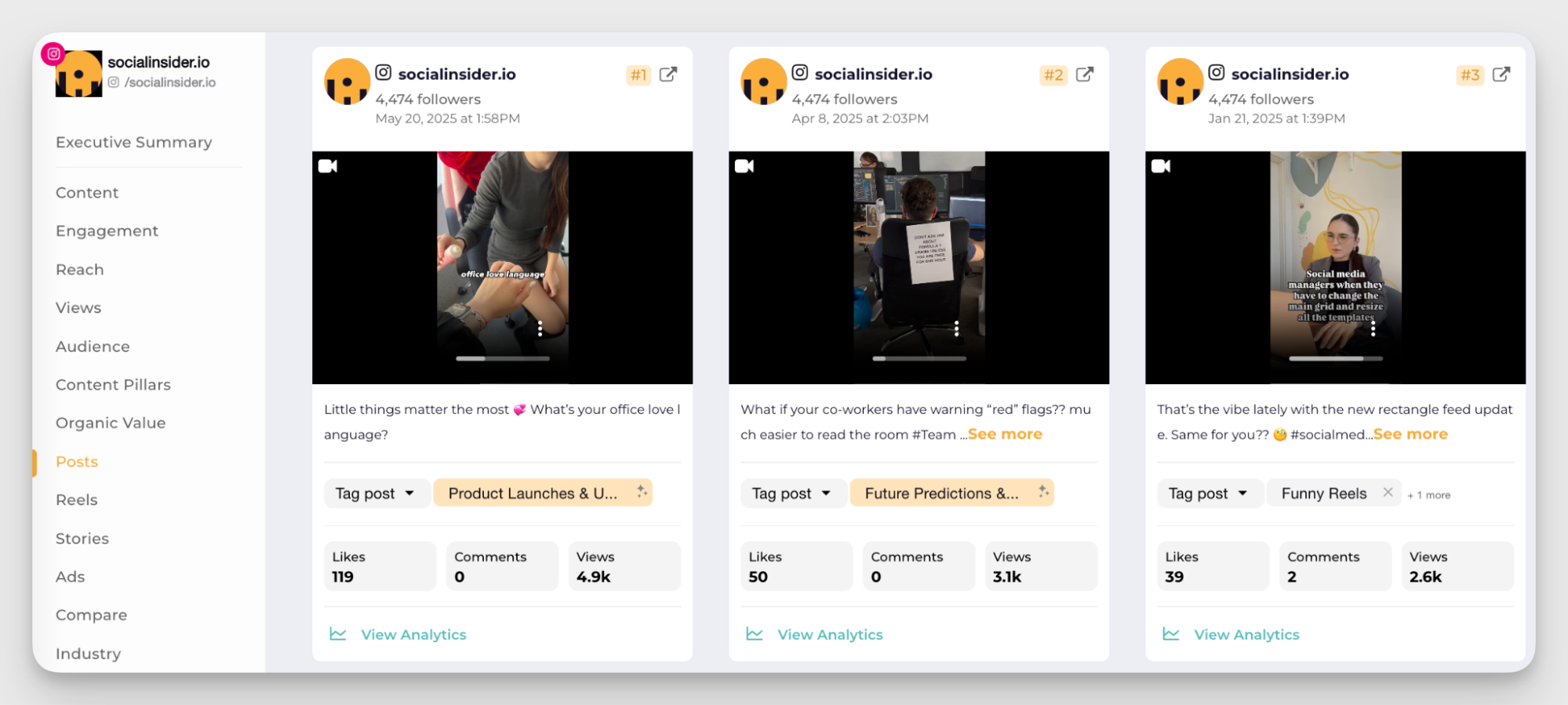
Final thoughts
In the battle of Facebook Reels vs. Instagram Reels, the right platform for your business ultimately depends on your brand’s goals, target audience, and content strategy.
Whether you're aiming for broad reach or high engagement, each platform offers unique advantages to help your brand shine.
Analyze your competitors in seconds
Track & analyze your competitors and get top social media metrics and more!
You might also like
Improve your social media strategy with Socialinsider!
Use in-depth data to measure your social accounts’ performance, analyze competitors, and gain insights to improve your strategy.




